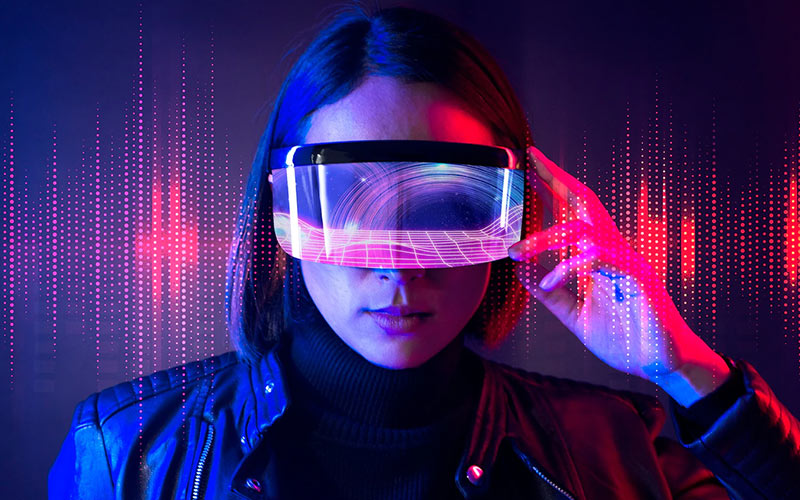
Casino Market specialists talk about the factors that determine the profitability of virtual reality platforms.
From this article, you will learn why flexibility, cryptocurrency support, and a developed social community have a greater effect in terms of profitability than beautiful graphics and a large selection of slots.
The Current Situation in the VR Market

In 2025, the digital space ceased to be an experimental technology and became a must-have form of entertainment. Its popularisation was affected by the mass production of affordable VR devices (Meta Quest 3, Pico 4, and Apple Vision Pro), as well as the introduction of Web3 infrastructure. This accelerated the spread of interactive formats.
According to the Technavio analytical company, the VR gaming market is growing by $1.74 billion per year, demonstrating an impressive compound annual growth rate (CAGR) of 24%.
VR casinos have become the most promising segment with the following indicators:
- 170 million — the number of active users of such devices in the world;
- 32–47 minutes — the average duration of a session;
- $35–$45 — average revenue per user (ARPU) per month;
- 30–35% — the percentage of return and repeated registrations (retention) over 30 days.
North America and East Asia are considered leaders in terms of VR device penetration and interest in immersive gambling. Europe and Latin America follow them. The latter is actively investing in the development of such solutions and IT infrastructure.
Factors Affecting the ROI of VR Projects
This year, many entrepreneurs are looking towards entertainment that takes place in the digital space, given the prospects of this area and the still low competition in the niche. However, the launch of such iGaming startups requires significant financial injections and an understanding of the market’s specifics.
Key points on which the profitability of casino portals depends:
Cost and Availability of Equipment
Even with the cheapening of VR headsets (like Meta Quest 3 or Apple Vision Pro), their penetration remains limited.
Budget models can be purchased for $250–$350, but this amount is often too much for players from developing countries. Therefore, immersive gambling is widespread mainly in North America, Europe, and Oceania (Australia, Japan, New Zealand) — these are regions with traditionally high gross income per capita.
To attract customers, entertainment sites are increasingly offering a hybrid format. It includes full VR access, as well as a 2D browser or mobile version for a comfortable game from smartphones.
Such successful VR portals as SlotsMillion VR and XR Casino are already implementing the Dual Access mode, with a quick entrance via a headset (Quest 3, Vision Pro) and regular devices (PCs or smartphones). This approach ensures:
- maximum audience reach;
- ARPU growth through hybrid monetisation;
- reduced entry threshold.
Depth of Customer Experience
The value of VR casinos is increasingly determined by realism and interactivity. For example, clients can walk around virtual halls, play with live dealers, and use voice chat.
The addition of gamification tools also increases retention indicators and the duration of sessions (on average, by 60–80%).
Casino visitors are interested in:
- missions, challenges, and daily rewards;
- NFT collections;
- VIP rooms and quest lines;
- PvP competitions.
A deeply researched UX interface with realistic graphics and exciting interactions ensures long-term retention of customers and increases their LTV.
Monetisation Through In-Game Goods
Operators can offer cosmetics for avatars (skins, clothes, or accessories), VIP access, exclusive lobbies, virtual real estate, and other original items.
A properly selected system of microtransactions and internal economy will increase ARPU and profitability of VR projects, making such startups extremely successful and unlike other niche solutions.
Integration with Web3 and Crypto Assets
Support for USDT, ETH, and BTC is another factor affecting the ROI of immersive platforms. The Web3 functionality makes the portal open, transparent, and engaging. This contributes to expanding audience reach.
For example, players can easily bypass banking restrictions using simplified micropayments. The presence of DAO mechanics helps with the formation of a developed community in which users become “co-investors” of VR firms.
Affiliate and Partnership Models
Immersive casinos actively cooperate with XR metaverses, bloggers, and streamers. They promote joint projects and collaborations, repost important events, broadcast game rounds, etc.
Revenue sharing, NFT partnerships, and cross-promotion between VR platforms stimulate the growth of Internet traffic and recognition, accelerating the attraction of new solvent clients.
Marketing and Retention
To effectively promote VR resources, it is important for entrepreneurs to create a powerful community around iGaming companies. This will ensure a stable traffic increase, which quickly converts into good profits.
For immersive online resources, the following elements work best:
- tournaments;
- VR shows with real dealers;
- events in metaverses.
Such activities give projects the status of a “power place”, form a community of interest, and contribute to repeat visits from players.
Regulation and Licensing in 2025

Let us consider in which jurisdictions it is worth launching a VR casino, and how the choice of country may affect its payback.
Curacao
The island state is the best choice for gambling startups. The budget cost of opening a business makes the region attractive to international investors.
Entrepreneurs pay:
- €4,600 as a one-time contribution;
- €47,500 annual fee for certificate renewal.
The advantages of working in Curacao include a quick launch. It is possible to start an iGaming project in 6–8 weeks. In 2 months, operators will have time to register a legal entity, open a bank account, obtain a licence, test the portal, and launch the final version of the website.
Both crypto and VR gambling are allowed in the country, and the legislation is designed to support and stimulate entrepreneurs in every possible way. The GGR tax is 2%, and corporate royalties are 0%.
In 2024, the government updated the regulatory framework. The main changes affected the classification of permits and compliance requirements.
Business owners should conduct KYC and AML verifications, as well as check the geolocation of players. If, for example, the site is accessed from prohibited jurisdictions (the US, the UK, or France), then providers must automatically block such IP addresses.
Malta
The local certificate has a good reputation in the international market. Launching a VR casino here will be cheaper compared to other European states. The trust of clients and B2B partners will make it possible to quickly monetise iGaming portals.
The cost of opening a digital resource:
- €25,000 — licence fee;
- €100,000 — reserve fund, which is accumulated in a separate bank account;
- GGR tax — 5–10% depending on annual turnover.
The key advantages of Malta are hassle-free entry into the EU, British, Asian, and Latin American markets, as well as a reliable image and impeccable regulation. At the same time, entrepreneurs will face strict checks and continuous monitoring of their activities.
Isle of Man
A permission to launch a VR casino will cost £5,000, and taxes will “take” another 0.1–1.5% of the GGR. In this regard, the country’s licence is considered one of the most expensive among offshore zones, but it allows operators to legally accept bets in the UK market.
Key requirements for project owners include:
- user verification and deposit protection at the highest level;
- availability of a local registration and hosting of the company's servers on the island;
- completion of an annual comprehensive audit.
VR Casino Trends and Future Prospects

By 2030, the virtual gambling market will continue to actively transition from the experimental stage to the maturity phase.
Thanks to cheaper headsets, improved UX, and Web3 integration, casinos of this type are becoming a profitable business model with high audience engagement and a quick return on investment.
The list of VR casino technologies that will be relevant in the next 5–10 years includes:
- Immersive Reality. Gambling projects of the future will provide full immersion and an almost indistinguishable from reality customer experience. Such platforms will support AAA-level graphics, tactile feedback (through gloves, suits, or chairs), and integration with AI for personalised communication with the audience.
- Social component. VR gaming will turn into a global network with elements of entertainment. Users will be able to independently form clubs, organise events, maintain blogs, and own non-fungible tokens.
- Total economic independence. This will become possible due to subsequent integration with Web3, cryptocurrency settlements, and the presence of DAO structures in which players will vote for the development of digital platforms.
- Ethical and transparent gambling. It is expected that regulators will start implementing VR security standards. This includes real-time behaviour monitoring, adding AI assistants for timely notifications or blocking, and passing KYC checks with an instant biometric verification.
- Hybrids of genres. One possible scenario is the combination of VR casinos with other popular formats. This could be integration with shooters, RPGs, or puzzles, the addition of PvP mechanics, and other components that can make entertainment sites part of the global digital world.
The Main Things about VR Portals
Virtual reality resources are a promising direction in the casino industry.
Aspects that should be taken into account:
- The payback of online platforms is affected by the cost and availability of VR equipment, the depth of user experience, and the affiliate models used. Good income comes from monetisation through the sale of in-game goods, as well as integration with Web3 and cryptocurrencies.
- The choice of jurisdiction also affects the ROI of VR casinos. It is best to launch a startup in Malta, the Isle of Man, Curacao, and other countries with a minimal tax burden on business.
- The future of immersive establishments is associated with full immersion in a virtual environment, as well as the integration of AI and popular gaming genres.
The Casino Market studio helps with the launch and promotion of innovative projects.
From us, you can order a VR portal, a website based on a Telegram bot, a blockchain resource, crash content, and security systems based on artificial intelligence.
Have questions or want to order services?
Contact our consultants:
- e-mail: manager@casino-market.com
- feedback form.
Check the information used to contact us carefully. It is necessary for your safety.
Fraudsters can use contacts that look like ours to scam customers. Therefore, we ask you to enter only the addresses that are indicated on our official website.
Be careful! Our team is not responsible for the activities of persons using similar contact details.








